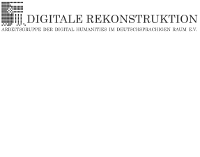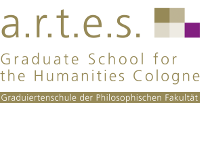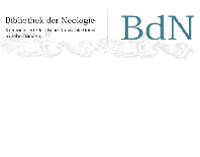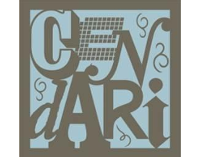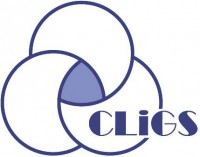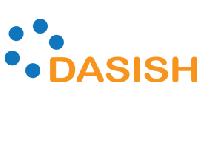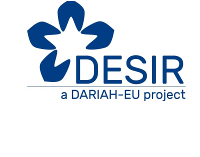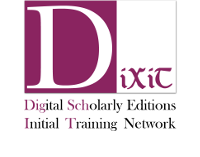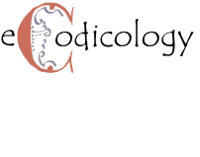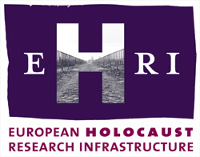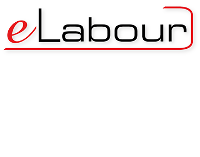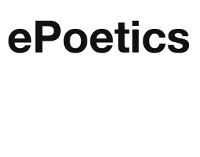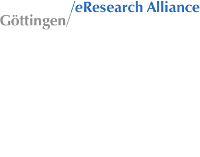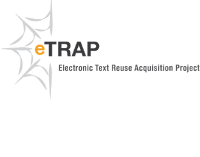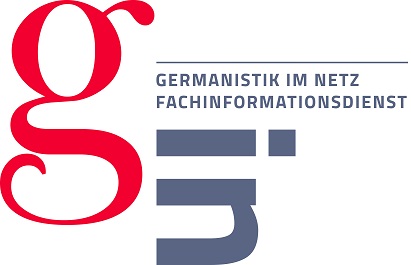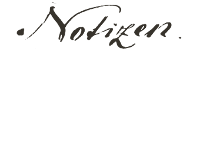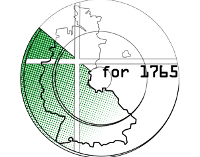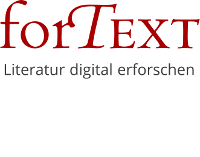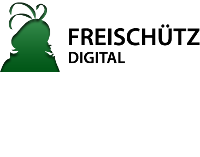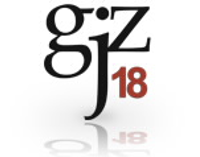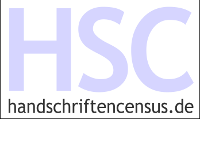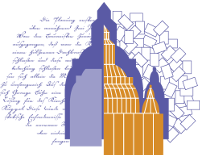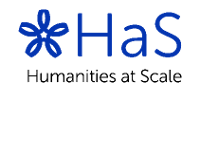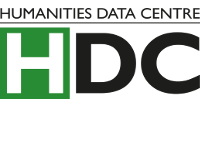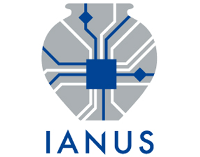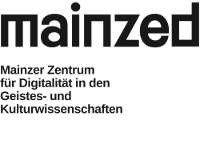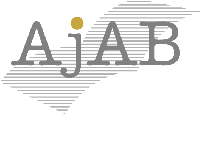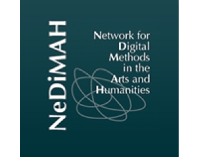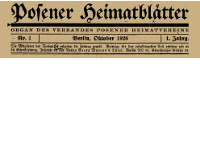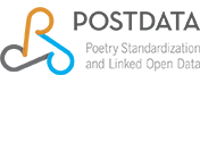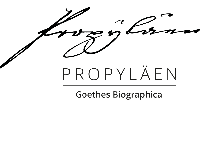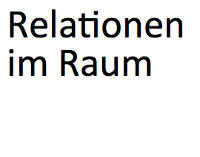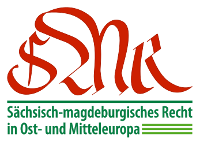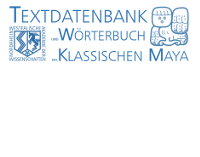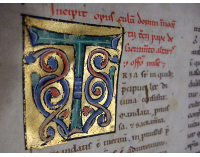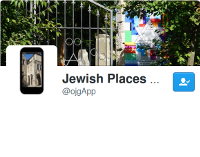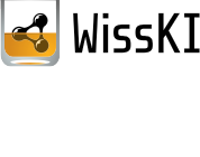Breadcrumb
- Collaborate
- Partner projects
Partner Projects
DARIAH-DE cooperates with initiatives and projects from the humanities and cultural sciences that conduct research using digital methods and that use or further develop the tools and services created by DARIAH-DE. On this page we present current and former projects of this kind.
If you would like to present your project here, please contact: info@de.dariah.eu.
Partner Projects
Partner Projects
|
|
3D-JoinsThe interdisciplinary research and development project "3D Joins und Schriftmetrologie" developed sustainable concepts and methods for the collection of character specififications depicted on fragmented cuneiform tablets, their assorting along quantitative characteristics and finally a 3D reconstruction of the individual cuneiform tablets. |
|
|
AMADAMAD – Archivum Medii Aevi Digitale is a project funded by the German Research Foundation and initiated by the Chair of Mediaeval History at the Ludwig-Maximilians-Universität München, the Academy Project Regesta Imperii and the Hessischen BibliotheksinformationsSystems (HeBIS). It focuses on opening and establishing an Open Access Repository associated with the scientific blog "Mittelalter. Interdisziplinäre Forschung und Rezeptionsgeschichte“. The purpose is to open new paths for scientific publications and to promote dialogue in the Mediaeval Studies. |
|
| Working group "Digitale Rekonstruktion"The working group "Digitale Rekonstruktion" emerged from the 1st anniversary of the Digital Humanities in the German-speaking world (25-28 March 2014, University of Passau). The working group brings together colleagues who have devoted themselves to digital reconstruction from the perspective of architecture, archeology, history of architecture, computer graphics and computer science. The working group provides a platform for exchange and establishment of digital reconstruction on behalf of acquisition, research and mediation of cultural and historical contents within the Digital Humanities. Main objective of the working group is bringing together stakeholders in the German-speaking world to address issues related to conceptual clarification and working methodology as well as documentation and long-term archiving of digital reconstruction projects. The work group comprises currently 55 persons from 33 institutions from German-speaking countries as well as 4 associate member institutions from Europe. |
|
| Working group "Digitale Romanistik"The working group "Digitale Romanistik" is associated with the Deutscher Romanistenverband. Aim of the working group is to reflect the challenges and opportunities of digitalisation and the requirements of the discipline to digital data stocks, infrastructures, training opportunities, promotion strategies and much more. It strives to support the association in the development of appropriate positions and strategies. In addition, the working group is the contact point for colleagues who would like to take part in workshops or search for further advice. In this sense, the working group also cooperates with the specialist information service Romanistik. |
| | ARCHITRAVEWithin the scope of Architrave, travelogues written by German architects and diplomats travelling to France are made publicly accessible via a richly commented digital portal. The travelogues are multifoldly linked with textual and iconographic materials. French and German scientific expertise on the art of Paris and Versailles are t be joined to achieve a computer-assisted investigation of the travelogues. The results are intended to open up innovative and sustainable opportunities for the research to the academic as well as for the general public. |
|
| a.r.t.e.s. EUmanitiesa.r.t.e.s. EUmanities is an innovative support program of a.r.t.e.s. Graduate School for the Humanities Cologne at the University of Cologne to establish a Graduate School for Humanities and Cultural Studies active throughout Europe and internationally. |
|
| Building a European academy portalThe project of the Union of German Academies of the Sciences "Building a European Academic Portal" sponsored by the German Federal Ministry of Education and Research (BMBF) from October 2015 to June 2017 pursued the goal of developing a concept for a pan-European digital infrastructure that would enhance visibility and findability Improving research in the arts and social sciences at the academies and facilitating international cooperation. To this end, the basic requirements for a future European academy portal (European Academies Internet Gateway, AGATE) were identified and possibilities were tested, existing offers and solutions concepts were integrated, reused and adapted. |
|
| Library of NeologyThe DFG-funded project library of neology (BdN) works on ten texts represenative for the neology as critical hybrid edition (print and digital). The neology is presented as a mature form of German enlightenment theology. The basis for the edition, which is developed cooperatively at the Westfälische Wilhelms-Universität Münster and the Niedersächsische Staats- und Universitätsbibliothek Göttingen, are XML files in TextGrid, from which both the print output as well as the digital edition are generated. |
|
| CENDARICENDARI (Collaborative European Digital Archive Infrastructure) provides and facilitates access to existing archives and resources in Europe for research on medieval and modern history. This will be achieved by developing a special search and usage environment. This environment is intended to facilitate access to important historical records and to create a powerful new platform for collaborative work across national boundaries. |
|
| CLiGSCLiGS (computer-supported literary genre styles) is a junior research group, located at the University of Würzburg and funded by the BMBF. The group works on the intersection of Romance studies (particularly French and Spanish literary sciences) and computer science (particularly text mining and machine learning) and is part of the digital humanities. The overarching aim of the group is to deal with basic literary-scientific questions, such as the relationship between style and genre, on the basis of specially compiled text collections and with current, quantitative methods of text analysis. |
|
| DASISHDASISH (Data service infrastructure for the social sciences and humanities) had been a cluster project that brought together all five ESFRI research infrastructure initiatives in the social sciences and humanities: CLARIN - Common Language Resource and Technology Infrastructure; DARIAH - Digital Research Infrastructure for the Arts and Humanities; CESSDA - Consortium of European Social Science Data Archives; ESS - European Social Survey and SHARE - Survey of Health, Aging and Retirement in Europe. The aim of the project had been to identify possible synergies in the development of infrastructures and work together on selected activities. |
|
| DESIRDESIR increases the use and awareness of the tools and services developed in DARIAH in the humanities' research community and contributes to the sustainability of digital research infrastructures in the humanities. To this end, measures are developed in six dimensions: dissemination in the sense of an improved perception of DARIAH in the humanities; Regional growth through new partner countries for DARIAH, technology, i. Development of tools and services, robustness in the sense of improved sustainability through proven business models, marketing strategy and a powerful organizational structure, strengthen confidence in DARIAH especially in the new communities, the offer of training and training activities. |
|
| DFG Priority Programme "Computational Literary Studies"Computational Literary Studies is an emerging interdisciplinary research field at the intersection of literary studies computer science aiming to apply computational methods to digitized literary texts to learn more literary history, narratology or literary writing style. In the priority programme SPP 2207 'Computational Literary Studies', starting in 2020, the German Research Foundation (DFG) funds innovative projects from this research field. |
|
| Digital4HumanitiesThe Digital4Humanities project focuses on broadening the knowledge and usage of digital research methods in the Humanities. The project will develop video tutorials to demonstrate how digital research methods are applied. The researchers want to achieve the following goals: 1. To promote digital competencies of students and lecturers in the Humanities, |
|
| Digital Humanities Research GroupThe research group "Digital Humanities" had been a joint project of the faculties and institutions of the University of Göttingen, the Max Planck Society, the Academy of Sciences of Göttingen and the Herzog August Bibliothek Wolfenbüttel, which had been integrated in the Göttingen Center for Digital Humanities (GCDH). The interdisciplinary cooperation aimed at innovative computer- and internet-related research questions and methods in the social sciences and humanities. The successful work of the research group has lead, among other things, to the establishment of a Digital Humanities Professorship at the Department of Computer Science at the University of Göttingen. |
|
| Discuss DataWith Discuss Data, the Research Center for Eastern Europe at the University of Bremen and the Göttingen State and University Library are jointly developing an interactive online platform for the discussion of research data and their quality. This virtual communication center for research data is intended to enable interactive participation and scientific discussions as well as quality management by the scientific community. Discuss Data is designed as a layer between distributed repositories and researchers. For storage and long-term archiving, the DARIAH-DE repository as well as - perspectively - the Humanities Data Centre (HDC) will be employed. |
|
| DIXITDiXiT (Digital Scholarly Editions Initial Training Network) is an international research and training network funded by the Marie Curie Actions of the European Commission from September 2013 to August 2017. The network consists of a number of renowned institutions oft the academic and private sector. The network strives to make a sustainable contribution to the development of new theories, methods and publication models in the area of digital editions. This is mainly being pursued by training and further education of young researchers. The network's partners include universities, national libraries, partners from software development , as well as free and non-profit knowledge organisations. The network is coordinated by the Cologne Center for eHumanities (CCeH) at the University of Cologne. |
|
| eCodicologyECodicology develops, tests and optimises new algorithms that automatically recognise the macro- and microstructural layout elements of the handwriting pages and incorporates this information within the metadata of images. |
|
| EHRIThe EHRI project unites the heterogeneous sources of the Holocaust distributed to different archives in Europe and beyond and builds a uniform Holocaust research area. These include the establishment of coordinated physical access facilities, a virtual research space with comprehensive access to all relevant research data, as well as research on authoritative standards and interoperability mechanisms. |
|
| A romantic network - edition of letters of the Marburger constellation around 1800The goal of the TextGrid project is to create a genetic-critical hybrid edition of the correspondence of Johann Heinrich Christian Bang with Jacob and Wilhelm Grimm as well as with Friedrich Carl von Savigny, the founder of the historical school of law (historische Rechtsschule). The pastor Johann Heinrich Christian Bang from Goßfelden near Marburg was a central node in a dense romantic network of letters, in which the Grimm brothers, the Brentanos and numerous other writers and scholars of the romantic movement participated. |
|
| eLabourIn the project group eLabour, four sociological research institutions (SOFI Göttingen, ISF München, IfS Jena, sfs Dortmund) have teamed up with three IT partners (L3S Hannover, Göttingen State and University Library and the GWDG Göttingen) to establish an interdisciplinary centre for IT-based qualitative industrial sociologic research. Since October 2015, the centre has been funded by the Federal Ministry of Education and Research (BMBF) within the funding programme for the digital humanities. eLabour pursues an interdisciplinary approach combining the development of a virtual research infrastructure and new IT tools linking up with industrial sociology. Content and methodological requirements of industrial sociology are being analysed and technologies from IT and information sciences are systematically combined to develop solutions for social sciences and information sciences. |
|
| ePoeticsePoetics aims at an advancement of the eHumanities by proving current information technological methods: analysis of corpora, statistics , textmining, visualisation, text- and corpusviewing. It employs the example of a corpus being central to the humanities: the 'Poetics and Aesthetics from 1770 to 1960'. |
|
| eResearch AllianceThe eResearch Alliance supports researchers with technological and information science specific services. By this it is aspiring to make current research methods more efficient and to promote new research methods. Initially the eResearch Alliance is working on topics reaching from research data management, visualisation to object collections. |
|
| eTRAPThe eResearch Alliance supports researchers with technological and information science specific services. By this it is aspiring to make current research methods more efficient and to promote new research methods. Initially the eResearch Alliance is working on topics reaching from research data management, visualisation to object collections. |
|
| Specialized information service in book studies, library and information scienceIn October 2017, the Herzog August Bibliothek Wolfenbüttel took over the development of the specialised information service in book studies and library and information science as part of the DFG-funded program "Fachinformationsdienste für die Wissenschaft". The aim is to build up a portfolio based on the top and specialized needs of the scientists of the supervised and adjacent disciplines as well as the development of a central detection portal. The portal development takes place in close cooperation with the Leipzig University Library, which already operates a proof portal for communication, media and film studies. In addition, a sustainable and attractive range of services is to be developed, which is oriented to the requirements of modern science communication and provided via the portal. The specialized information service aims to close the supply gap created by the discontinuation of the b2i portal. |
|
| Specialist Information Service (FID) German StudiesThe specialist information service (FID) for German Studies is a project funded by the German Research Foundation (DFG) that develops innovative and attractive services for German research. The project is located at the Johann Christian Senckenberg University Library in Frankfurt am Main. A new infrastructure based on the online portal "Germanistik im Netz" (GiN) will be created for central activities of philological practice such as "researching", "informing", "publishing" and "researching". The FID provides bibliographic title references, digital full texts, selected websites and scientific-organisational information under one interface. The subject-specific publication server "GiNDok" and a free hosting service for e-journals and other periodicals promote the idea of Open Access within the Germanic community. As part of the specialist information service, the "GiNGuide" tool is also being developed, which offers an introduction to digital forms of work. The service portfolio is rounded off by the "GiNLab", which offers space for research-supporting methods. The information services are implemented in close exchange with the research community and developed conceptually in dialogue with a scientific advisory board. |
|
| Fiddle songs plusCarl Louis Bargheer, Fiddle songs plusThe estate of the violinist Carl Louis Bargheer (1831-1902) at the Lippische Landesbibliothek Detmold contains a number of reworked versions of his fiddler songs for baritone, violin and piano based on texts by Theodor Storm. Within a student project, a hybrid edition of these songs and an extendable website have been established, that providing extensive information on Bargheer and its context. Tools from the TextGrid-Lab were being used to set up a page based on the XML standards TEI and MEI, which was subsequently published with the support of the DFG project Edirom. |
|
| Fontane's notebooksThe hybrid output of the unpublished notebooks by Theodor Fontane consists of two complementary parts, which visualise materiality in a graded way and enable document-oriented, chronological and teleological accesses. The digital edition will publish all notebook records in a synoptic representation of the digital copy and the diplomatic transcription as well as a historic-critical edited text along with text-critical apparatus and comments. |
|
| FOR 1765FOR 1765 develops a standardised, accessible database, comprising of linked biographical, institutional, bibliographic and thematic data. In the course of this project, a cross-linking of actors, topics and publications on "Protestantism in the ethical debates of the Federal Republic of Germany" will be presented in a new way. Based on the "Confluence" Wiki tool provided by DARIAH-DE, a mapping of Protestantism and its social references will be established.
|
|
| forTextforTEXT is developing a collaborative research environment for literary scientists, focusing on the two most prominent methods of analysing hermeneutic texts: text annotation and text analysis. forTEXT aims in particularly to open up direct, low-threshold, and functional access to digital methods for traditional-working literary scholars. |
|
| Freischütz Digital (FreiDi)Freischütz Digital was a collaborative project funded by the German Federal Ministry of Education and Research (BMBF) between 2012 and 2015 with partners from the Goethe University Frankfurt, the International Audio Laboratories of the University of Erlangen, the Musicology Seminar Detmold / Paderborn and the University of Paderborn. The goal was the exploration of current possibilities of genuinely digital music editions using the example of Carl Maria von Webers Freischütz. All the domains of the work (graphical, logical and acoustic / performative) were taken into account and all text and music parts with coding standards (TEI and MEI) were recorded for the first time. The aim of the project was not an edition in the traditional sense (which is presented analogously in the context of the Weber total edition) but the exemplary demonstration of new possibilities for the processing, enrichment and reuse of encoded data. In order to provide this data permanently for the community, an integration into the TextGrid repository or later in DARIAH-DE was planned right from the beginning, especially since it was foreseeable that the extraordinarily extensive data stock would have to be developed deeper and deeper. In the meantime, this is done by means of subsequent student follow-up projects or appropriate qualification work, so that the web presence realized with Edirom online can be viewed as work in progress and data can still be transferred to the DARIAH repository in the longer term. |
|
| Scholarly Journals of Knowledge in the Age of EnlightenmentSince 2011, the most important German-speaking representatives of interdisciplinary polyhistorical journals have been developed in the context of the project "Scholarly Journals and Newspapers as Networks of Knowledge in the Age of Enlightenment". Under the auspices of the Academy of Sciences of Göttingen, a database of 323 magazines (about 2,775 volumes and 1,260,000 pages) will be digitally researched. The period of development extends from 1688 to 1815, thus covering the entire range of scholarly journals and newspapers of the Enlightenment. |
|
| Global research and imperial powerThe DFG-funded project (since 2015) Globale Forschung und imperiale Macht: Das botanische Kommunikationsnetzwerk Nathaniel Wallichs compiles the biography of the Danish botanist Nathaniel Wallich and reconstructs its global communication network. The project team from the chair of Northern European History at the CAU Kiel analyses thousands of letters of his coorespondence and draws conclusions on the duration, geographic distribution and intensity of the relationships with the different communication partners. In addition, qualitative statements about the course of communication, individual career strategies and patronage structures, the relevance of religious and national identities in the multireligious and multinational North Indian environment, as well as the institutionalisation of research are possible. Applying the Geo-Browser from DARIAH-DE, the collected data are visualised and analysed with regard to their intensity and their global distribution. |
|
| HandschriftencensusThe aim of the Handschriftencensus is the complete recording of the German-language manuscripts of the Middle Ages. It is about a collection of some 26,000 textbooks, which are located in more than 1,500 libraries worldwide. |
|
| Hannah Arendt. Kritische GesamtausgabeThe edition project "Hannah Arendt. Critical Collected Works" aims to create a critical hybrid edition of published and unpublished works by Hannah Arendt. The edition is structured according the projects introduced by Hannah Arendt herself (Marx lecture, six essays). Published and unpublished texts, including pre-versions and revisions, as well as additions by various genres, such as essays, reviews, and notes, will be edited and published as a digital and a print version. The project is being financed by the Vanderbilt University, the Freie Universität Berlin and the Göttingen State and University Library. |
|
| HIRMEOSHigh Integration of Research Monographs in the European Open Science Infrastructure (HIRMEOS) is a 30-month EU project funded under the Horizon 2020 program. HIRMEOS intends to convert collections of passive documents into enriched content by supplementing them with various supplementary information from the field of open science standards that enable their integration and linking with other scientific information. Innovative services for monographs are developed with a view to the full integration into the European Open Science Cloud and the participating platforms (OpenEdition Books, OAPEN Library, EKT OpenBookPress, Ubiquity Press and Göttingen University Press) are equipped with various tools. These enable identification, authentication and interoperability (via DOI, ORCID, Fundref), information and entity extraction (INRIA (N) ERD), the annotation of monographs (hypothesis), and collection of usage data and alternative bibliometric metrics. HIRMEOS will also enrich the technical capabilities of the Directory of Open Access Books (DOAB), one of the most important indexing services for open access monographs worldwide, to receive automated information for the integration of monographs. At the same time, a structured certification system for the peer review of monographs is also being developed. |
|
| Historical reception analysisAs part of the project funded by the Volkswagen Foundation, an online search tool called RetroContext will be developed, which will allow access to digital humanities data of various origins and formats. Various library catalogs and publicly accessible digital catalogs (such as Google Books) are scanned and the corresponding results are displayed over a uniform interface. The application has been developed in a targeted way to provide researchers with research and research on human and cultural sciences with results at specific time periods. |
|
| HistStadt4DDigital copies of historical photographs as well as digital plan archives and possible use scenarios for historical research as well as spatial models of historical objects, are research subjects of the eHumanities. The project HistStadt4D explores the history of the city of Dresden by means of aforementioned contents from the Deutsche Fotothek and provides the data to researchers and the general public by applying a 4D browser and a location-dependent augmented reality representation. These data serve not only as information and research tool but is also suitable for disseminating historic knowledge. |
|
| Humanities at ScaleThe research project "Humanities at Scale" - based on specific requirements of human and cultural research projects - aims to develop further digital components and set the technological basis for DARIAH-EU. This creates a modular infrastructure, which can be used by research projects to research collaboratively. |
|
| Humanities Data CentreThe Humanities Data Center (HDC) is a research data centre for the humanities. It offers several services for humanities research data regarding long-term preservation and presentation. In addition the HDC supports research in the humanities through consultancy and training programs. |
|
| IANUSIANUS is a DFG-funded project for establishing a national research data centre for the archeology and classical studies and is coordinated by the German Archaeological Institute in Berlin. It aims to develop a sustainable data and service infrastructure where digital research data is described specifically, cataloged, curated, archived and, where possible, made freely available. By this IANUS wants to promote the exchange of research results, enable long-term reuse of research data and counter the imminent loss of primary and secondary content. In addition, IANUS draws up and publishes the "IT recommendations for the sustainable use of digital data in the classical studies" and collects information on archaeoinformatic teaching materials, courses and courses in the field of education and qualification. |
|
| Klaus Mollenhauer Gesamtausgabe (KMG)Klaus Mollenhauer (1928-1998) is considered one of the most important and prominent German educational scientists of the 20th century. Recently, an international reception of his late work can be observed, while in Germany some of his writings can only be found through antiquarian book trade. This research gap will be filled by creating a text-critical and annotated edition of Klaus Mollenhauer's writings. The edition will be supplemented by parts of Mollenhauer's estate and be published in the online portal "Klaus Mollenhauer Gesamtausgabe – KMG". The editiorial work is provided by three working groups at the universities of Göttingen, Lüneburg and Osnabrück. Based on this Internet edition, a printed book version will subsequently be published. |
|
| Kommentierte digitale Edition der Reise- und Sammlungsbeschreibungen Philipp Hainhofers (1578-1647)In this digital edition, the travel relations of the Augsburg merchant and agent Philipp Hainhofer (1578-1647) are for the first time presented completely in the form of digital facsimiles of the manuscripts and as full text, and provided with extensive critical apparatus and commentaries in text and image. The first project phase until 2020 comprises the descriptions of his five journeys to the Munich Court, which he made between 1603 and 1636. In a second phase, the journeys to Nuremberg, Regensburg, Neuburg, Heidelberg and Stuttgart will be published until 2023, followed by the journeys to Stettin, Innsbruck and Dresden. The final phase of the project will focus on the travel diary of the study and early adult years as well as a number of smaller spa stays. The long-term project funded by the DFG is scheduled for completion in 2029. In addition to the complete in-depth development of Hainhofer's travel relations, which has long been desired, the project also serves two other humanities-related key objectives. These are, on the one hand, a sharpening of the question of the function and significance of cultural mediation and translation in an inner-European area in times of heightened political and confessional conflict, and, on the other hand, an attempt at a renewed approach to interdisciplinarity in which different disciplines are integrated to the same extent. |
|
| mainzedThe Mainz Centre for Digitality in the Humanities and Cultural Studies (mainzed) pools the digital competences in the Mainz humanities and cultural sciences. Research projects are jointly planned and implemented and the ensuing results, developments and experiences are made available to all partners. The Academy of Sciences and Literature Mainz, the University of Mainz, the Institute of History at the University, the Johannes Gutenberg University, the Leibniz Institute for European History, and the Central German-Roman Museum with Leibniz Research Institute for Archaeology are partnering in the operation of mainzed. |
|
| Multimediales Archiv jüdischer Autorinnen und Autoren in Berlin 1933-1945The Axel Springer Endowed Chair for German-Jewish Literature and Cultural History, Exile and Migration (AjAB) is working on the implementation of a multimedial "Archive of Jewish Authors in Berlin 1933-1945", documenting the persecution of Jewish authors in Germany during the national socialism. The AjAB is particularly instructed by various concepts like archive, library, science platform, research cooperation and teaching platform. |
|
| NeDIMAHThe NeDiMAH project (Network for Digital Methods in the Arts and Humanities) was funded by the European Science Foundation from 2011-2015. As its objectives, the project defined the creation of a map that visualizes the use of digital research in Europe, an ontology of digital research methods and a collaborative and interactive online platform for the European research community. The project results can be found in the brochure Beyond the Digital Humanities. |
|
| Poznan Home of German JewsThe German-Polish cooperation project funded by the BKM investigates how tradition, cohesion, self-perception and interest in the "homeland of Poznan" developed among the German Jews who emigrated from the province of Poznan after the Polish state had reemerged. In particular, the project focuses on the "Poznan Heimatblätter" as a primary source. The georeferenced bibliography of the contributions is visualized in the DARIAH Geobrowser. The binational team also uses the DARIAH Wiki and Etherpad for contemporary collaborative collaboration across borders. |
|
| POSTDATAUNED is the National Distance Teaching University in Spain, a public university established in 1972 with a long tradition in teaching and research. UNED hosts LINHD www.linhd.es, the first Digital Humanities centre in Spain. Founded by Elena González-Blanco in 2014, LINHD has rapidly made a name for itself with a series of high-profile projects, most recently the ERC Starting Grant: POSTDATA („POetry STandardization and Linked Open DATA“, ERC-STG-679528) , and Evilinhd (A virtual Research Environment for Digital Humanities Projects), funded by the Spanish National Ministry, among other projects. It has been recognized together with the UPV and UPF Universities as a CLARIN-K Knowledge center, and LINHD is in charge of organizing the DayofDH since 2015, the first time it was held outside of North America. The lab was created as an interdisciplinary centre with a strong research and training focus. It already gives support and manages seven Digital Humanities Projects and offers a wide range of training programs, with a special focus on digital edition, digital libraries and semantic web technologies and also an annual DH Summers School. |
|
| PROPYLÄENThe PROPYLAEA open up Goethe's biographica. Diaries, correspondence and testimonies of Goethe's encounters and conversations are made accessible for the first time on a digital platform in addition to the traditional book editions. The project pursues two objectives: First, the continuation and completion of the historic-critical editions of Goethe's diaries (GT) and letters (GB), the regesta edition of the letters to Goethe (RA) and the publication of Goethe's encounters and conversations (BG). Secondly, the project wants to establish a digital research platform, in which all texts, comments and registers developed in the editions are brought together and linked together. The platform will be freely accessible. In addition to the contents of the printed editions, the platform will contain the facsimiles of all handwritings on Goethe's Biographica, as well as the complete transcriptions of the letters to Goethe. In this way, users are given the opportunity to search the sources together with their comments in a differentiated way and to structure the results according to their own needs. The information architecture of the platform is openly designed so that autobiographical texts of Goethe and other digital resources, source and reference works can be integrated. |
|
| Relations in spaceRelations in space analyses and visualises spatial relations between tombs of Jewish cemeteries from nine centuries (11th-20th centuries). On the basis of concrete research questions and in an exchange between the participating cultural scientists and computer scientists, a "topography visualizer" will be developed that will enable the analysis of a wide variety of cemetery ensembles. |
|
| Religious peacekeeping and peace buildingFor the first time, the source edition provides a textual basis for comparative research into the foundations of pre-modern peace building in religious matters throughout Europe. The edition will cover the period from the first Kappeler Land Peace of 1529 to the so-called Woellner Religious Edict of 1788. In the approximately 50 religious peace treaties, strategies and mechanisms were developed to achieve a cooperative balance or at least a coexistence of the emerging denominations after the break-up of religious unity in the wake of the Reformation and numerous religious wars. With the digital source edition, texts are made accessible in their first published form (first prints), which makes it possible in the first place to analyze the diversity and idiosyncrasies of early modern religious peace in an interdisciplinary manner. On this basis, political, legal and theological negotiation premises and argumentation patterns, the experiences of the parties to the conflict and the solutions developed for peaceful coexistence can be identified in their context and interdependence. |
|
| The Saxon-Magdeburg law as cultural link between the legislations of East and Central EuropeThe "Sachsenspiegel" of Eike of Repgow (ca. 1225) and the known municipal law of Magdeburg, apart from Roman and canon law, form the common foundation of Central and Eastern European legislations. The research project of the Saxon Academy of Sciences Leipzig took up its work in line with the accession of several Eastern European countries to the European Union in 2004. It is devoted to the spreading of the Sachsenspiegel and the Magdeburger Stadtrecht (municipal law) in Eastern Central Europe (Estonia, Latvia, Lithuania, Poland, Romania, Russia, Slovakia, Czech Republic, Ukraine, Hungary, Belarus). The reception of Saxon-Magdeburg law in Eastern Central Europe is presented in handbook-like publications and examined both in terms of language and language. In addition to its scientific orientation, the project is intended to highlight the shared cultural-historical heritage in a modern Europe. The so far only printed work results are to be processed for digital use, but also investigations on late medieval and early modern legal texts with the methods of parallel and diachronic corpus linguistics are to be carried out and presented in the work environment. The project's bibliography (www.magdeburger-recht.org/smr) is available online. |
|
| SaDAThe goal of the project "SaDA - Semi-automatic Difference Analysis of Complex Text Variants" was the elaboration of sub-processes of philological work for the filiation of transmission variants of a text and for the reconstruction of the text genesis with the existence of a multitude of variants, which can be supported by information technology methods and tools. |
|
| SlaVaCompBased on the example of the Greek-church-linguistic translations and church-linguistic original texts in Eastern and South-Eastern Europe, exemplary diachronic and regional differentiations of the language Kirchenslavisch (church slavonic) were investigated. The project used analysis tools (church slavonic tools in TextGrid). Also an index and a bilingual online dictionary for the study of graphical and lexical variability of church slavonic in its temporal and spatial development were prepared. |
|
| TEACaNTracing Early American Captivity Narratives (TEACaN) is an interdisciplinary project at the interface of literary and cultural sciences, computer linguistics and geoinformatics. Subject of the research project is the captivity narrative, often understood as one founding genre of American literary and cultural history, and its role for the imagined communities in North America. Starting point are reports of prisoners of different "contact zones" of the western hemisphere, connecting the European metropolises with Asia and Africa as well as North and South America. Based on the results of the relevant "analogous" research, TEACaN expanded the field of transnational captivity studies by a computer-assisted analysis of about 400 captive counts between 1500 and 1900. Aim of the project is to demonstrate topological and topographical demarcations and connections and thus to capture the multidimensional relationships of the captivity narratives among themselves as well as their geographical spread. GIS-supported software, web-based reading and text analysis environments as well as computer-linguistic procedures for the determination of structures of action are intended to a.) Transnational literary-historical developments, b.) Questions of the author in relation to the power of the narrative subjects and c.) The specific "Grammar," the event and motivational structure of Captivity Narratives in transhistoric and transnational perspective. In addition to intertextual connections, the focus is on paratextual relationships, which in turn reveal the constitutive significance of the captivity narrative for the literature market of early America. |
|
| Textdatenbank und Wörterbuch des Klassischen MayaThe long-term project "Text Database and Dictionary of the Classic Maya" of the Academy of Sciences and Arts in North Rhine-Westphalia is located at the Rheinische Friedrich-Wilhelms-Universität Bonn. The aims of the project are twofold: on the one hand the exploration of the hieroglyphs of pre-Spanish Mayan culture (500 BC to 1500 AD), on the other hand the preparation of a dictionary as well as a corpus-based database of classic maya. |
|
| TextGrid Implementation of SharedCanvasThe SharedCanvas data model has been developed by the Stanford University Library, Los Alamos National Library, and the OpenAnnotation Collaboration (with the support of the Mellon Foundation). The SharedCanvas partner libraries consist among others of the British Library, the Bibliothèque Nationale de France and the Johns Hopkins Library in the USA. The TextGrid repository has been made compatible with SharedCanvas tools. This allows SharedCanvas users to access content from the TextGrid repository in order to work with it. The tools developed by SharedCanvas have been integrated into TextGrid. The implementation extended the user community of TextGrid by making repository content available to SharedCanvas users and partner institutions while providing TextGrid users with access to SharedCanvas compatible content from other institutions. |
|
| Universal-KirchenzeitungFor the development, analysis and digital edition of the "Universal Church Newspaper for the Clergy and the Educated World Class of Protestant, Catholic and Israelite Germany" as a subproject of the "German-Jewish Journalism of the 19th Century" (Steinheim Institute / DISS), various DARIAH-DE tools such as Geobrowser and Digivoy were used. |
|
| Networked correspondencesThe "Networked Correspondences - Research and visualization of social, spatial, temporal, and thematic networks in correspondence" centered around the correspondences of German-speaking writers who had been exiled under the national socialists. By employing DH methods, the letters should be crosslinked, indexed and intelligently tagged to ultimately visualizs entire correspondences and theme networks. |
|
| Virtual Skriptorium St. MatthiasThe digitisation and virtual reconstruction of the St. Matthias manuscripts of Trier's Benedictine Abbey makes an important medieval fundus online accessible. The virtual reconstruction addresses more than 500 codices ("Kodizes") spread over 25 locations worldwide. In addition to the digitisation the content is linked to existing catalog descriptions via a database. By storing the data at the University of Trier as well as in the TextGrid repository, long-term preservation and decentralised storage via iRods is guaranteed. The corpus of the data from various manuscript catalogs has led to the digitalisation of the data. The images are to be developed both by means of tools, such as TextGrid, by people, both editorial and interpretative as well as in the project "eCodicology" with the help of the computer. |
|
| Web App Places of Jewish HistoryThe mobile browser app of the Steinheim Institute opens up "places of Jewish history" in Germany and Europe to match the chosen geographical starting point: (former and surviving) synagogues, Jewish cemeteries, places of historical events, memorial sites, Holocaust. The app is open Data and Citizen Science and includes an interface to mobile navigation as well as a German-English user interface. |
|
| Scientific Communication InfrastructureWithin the framework of the DFG-funded research project "Scientific Communication Infrastructure", a virtual research environment was developed at the GNM in cooperation with the University of Erlangen-Nuremberg and the research museum Alexander Koenig, Bonn (ZFMK). The main aspect of data collection and preservation in WissKI are the semantic connections through comprehensive support of current Semantic Web technologies. The classification and storage of the collected data is based on the ISO standard 21127. On the basis of this technology, solitary data are combined into a semantic network in order to allow the direct visibility of deeper connections. The web-based system design allows access via the Internet, the connection of externally curated data sources (so-called authority files) and the provision of selected data via common online interfaces. |

